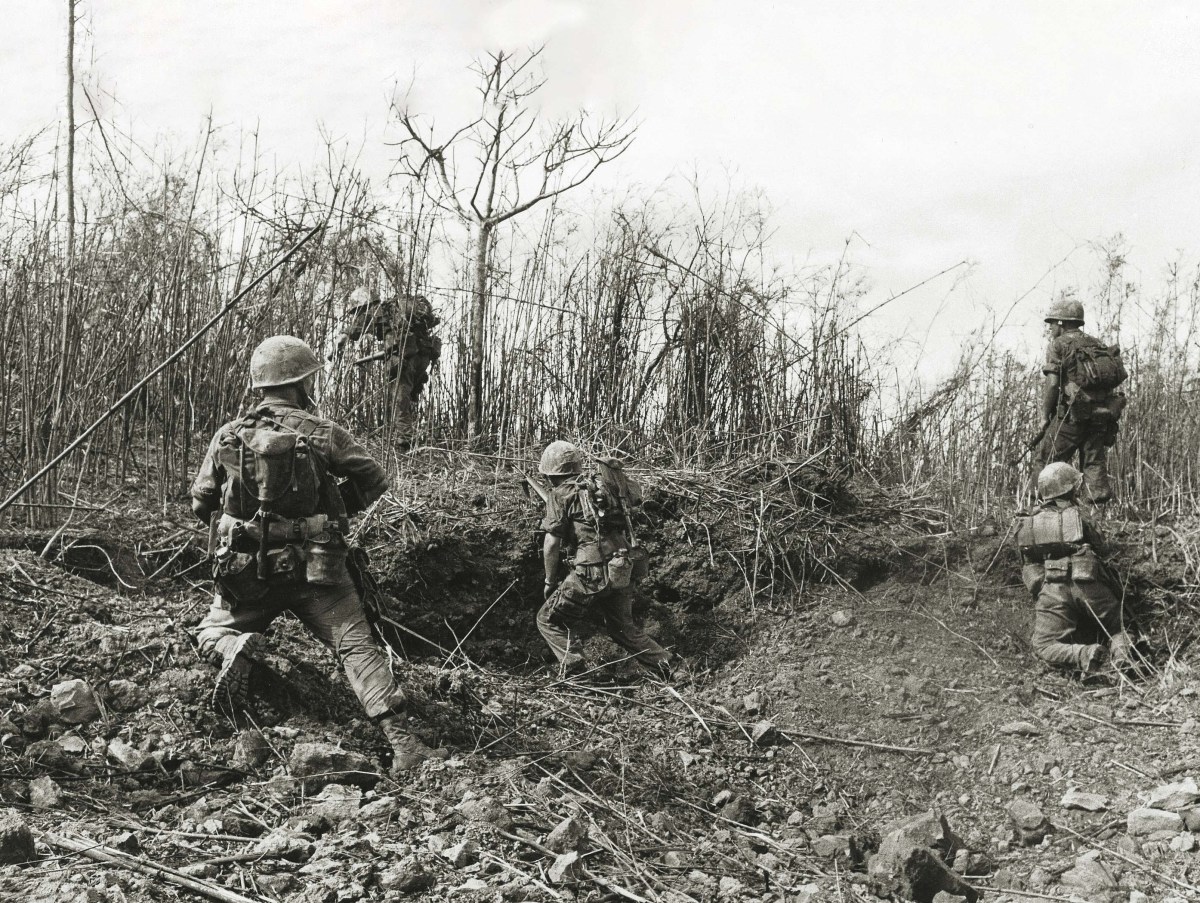Why, one must ask, would a healthy young man in the prime of life throw his body onto a live grenade and simultaneously pull a second one underneath himself, knowing it meant his certain death?

On Easter Sunday, March 26, 1967, while desperately battling North Vietnamese Army regulars near Vietnam’s Demilitarized Zone during Operation Beacon Hill, U.S. Marine Pfc. Douglas Dickey, 2nd Platoon, Company C, 1st Battalion, 4th Marine Regiment, 3rd Marine Division, did exactly that. Knowing he would surely die, 20-year-old Dickey leapt on the grenades, smothered the blasts with his body and saved the lives of five Marines in his platoon. For Dickey’s selfless “final valiant act” he posthumously received the Medal of Honor.
The reason why Dickey consciously dove on those grenades cannot be known with absolute certainty yet can be surmised by reading an excellent new book, A Final Valiant Act: The Story of Doug Dickey, Medal of Honor, by retired Marine Lt. Col. John B. Lang. A Naval Academy graduate and decorated combat veteran of the Gulf War, Iraq War and operations in Somalia, Lang has crafted a compelling, detailed and comprehensive examination of Dickey’s life, woven into the lives and too-often tragic deaths of comrades in 2nd Platoon.
Lang takes readers to the platoon’s annual postwar reunions, moving reminders of the courage and sacrifice exhibited by Dickey and his fellow fallen Marines. The author also provides an excellent “snapshot” of the Marine Corps in northernmost South Vietnam in 1967—then facetiously termed “Marineland” (think “Disneyland” with live ammo) by their Army counterparts. The Corps does everything in its own unique manner, Lang emphasizes.
Importantly, this book provides readers the best insight into the life and experiences of a Medal of Honor recipient since the acclaimed autobiographies of World War II Army hero Audie Murphy, To Hell and Back, and U.S. Special Forces officer, Roger H. C. Donlon, the Vietnam War’s first recipient and author of Beyond Nam Dong.
Reading Lang’s book, we get to really know Dickey. He wasn’t a natural athlete, as revealed at Marine boot camp, where his struggles with the physical training test led to a delayed graduation after a miserable, humiliating stint in the dreaded “Physical Conditioning Platoon.” What Dickey lacked in physical skill, he made up for in grit, guts and determination. He was a dependable, hard worker on his family farm in western Ohio and with his Marine squads in Vietnam. A genuinely nice guy, he was someone friends and colleagues knew always “had their back.”
Dickey knew exactly what he was doing when he unhesitatingly leapt on those grenades and understood precisely what it would cost him, as Lang proves through eyewitness accounts revealed in his book.
The testimony of 2nd Platoon’s Navy hospital corpsman, Greg “Doc” Long, echoes the recollections of several other eyewitnesses. Long “saw Doug look down at the first grenade. Then he saw Doug look up—and glance into the faces of the men around him who were trapped in the grenade’s blast area—they were his friends. ‘He kind of glanced around before he dove on the grenade,’ Long said… ‘he fell on top of [the first grenade]—and looked up—and here come another [grenade],’ Long said, ‘and he grabbed that one.…I remember him turning his head and looking me right in the face…And it seemed like forever and we were just looking at each other. I mean, he knew he was going to die…And he had this pacified look on his face…I was just starting to think, “Whew! They’re duds!”—when they exploded.’”
Dickey’s body absorbed the full blast of the two Chinese stick grenades. He died instantly. Long lamented how close Dickey came to avoiding this supreme sacrifice. He was killed just three days before he could have gone home.
Dickey did, of course, go home to Greenville, Ohio—his broken body traveled there in a military casket. He was laid to rest with full military honors in the town’s Brock Cemetery on Friday, April 7. It seemed like all Darke County turned out to honor Dickey. By the end of the war, 24 more young Darke County men joined Dickey in Brock and surrounding village cemeteries.
Dickey’s self-sacrifice was not the first time a U.S. Marine had done the exact same thing in nearly exact circumstances. On Iwo Jima on Feb. 20, 1945, 17-year-old Marine Pvt. Jack Lucas threw his body on an enemy grenade, then, like Dickey, grabbed a second grenade and pulled it underneath his body. Incredibly, Lucas survived the explosions and lived an additional 60 years.
The World War II Marine provided an answer to the question of “why” anyone would dive onto live grenades: “I saw two grenades over in front of my buddies…I hollered ‘Grenades!’ to alert my buddies,” then jumped onto them as they exploded.
Dickey dived on those grenades to save his buddies. Everything about Dickey, as told in Lang’s outstanding book, leads to that conclusion: “Fifty-eight Marines eventually earned the Medal of Honor during the Vietnam War,” he writes. “Forty-four of those were posthumous awards. They went to young men who, like Douglas Dickey, died saving their buddies.”
Added confirmation comes from former Marine Colin “Mac” McClelland, who related a prophetic anecdote from the time he and Dickey were discussing an article “in Stars and Stripes about a Marine or soldier who had just been awarded a posthumous Medal of Honor for diving on a grenade to save his comrades…And I remember [Dickey] straight out looked at me—right in the eye, and said, ‘You know, Mac, I’d do it.’ And I said, ‘Are you serious? …You won’t know that!’ And [Dickey] goes, ‘Yes, I do. I would.’” On Easter Sunday, March 26, 1967. V
This post contains affiliate links. If you buy something through our site, we might earn a commission.
This article appeared in the December 2021 issue of Vietnam magazine. For more stories from Vietnam magazine, subscribe and visit us on Facebook.





